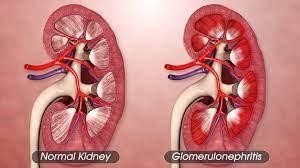A client with glomerulonephritis is preparing for discharge and asks the nurse which kind of diet to follow upon returning home. Which dietary teaching should the nurse include in the discharge instructions?
Follow low carbohydrate diet with low glycaemic index foods.
Eat a high protein diet three times a day.
Avoid foods high in potassium.
Restrict sodium rich foods and excessive oral fluids.
The Correct Answer is C
Choice A
Following low carbohydrate diet with low glycaemic index foods is incorrect. This recommendation is not specifically related to the management of glomerulonephritis. While managing carbohydrate intake might be relevant for individuals with diabetes, it's not the primary focus for someone with kidney inflammation.
Choice B
Eating a high protein diet three times a day is incorrect: While protein is important for overall health and recovery, a high protein diet might not be the best recommendation for someone with compromised kidney function. Excessive protein intake could potentially put additional strain on the kidneys.
Choice C
Avoiding foods high in potassium is correct. Examples of foods high in potassium that the client should be cautious about include bananas, oranges, potatoes, tomatoes, spinach, and other fruits and vegetables. Glomerulonephritis is a condition involving inflammation of the glomeruli in the kidneys, which can affect kidney function and the regulation of electrolytes, including potassium. In glomerulonephritis, the kidneys might have difficulty filtering and excreting excess potassium, leading to a potential build-up of potassium in the blood (hyperkalaemia).
Choice D
Restricting sodium rich foods and excessive oral fluids is incorrect. This recommendation aligns more closely with managing fluid retention and blood pressure, which can be relevant for individuals with kidney issues. However, the primary concern in glomerulonephritis is often potassium balance, making the recommendation to avoid high potassium foods more pertinent.

Nursing Test Bank
Naxlex Comprehensive Predictor Exams
Related Questions
Correct Answer is A
Explanation
Choice A
Counting carbohydrates will ensure glucose levels stay within a normal range is accurate. When providing dietary education to a client with Type 2 diabetes mellitus, it's important to emphasize the role of carbohydrate counting in managing blood glucose levels. Carbohydrate intake significantly impacts blood sugar levels, and counting carbohydrates can help the client make informed decisions about their meals and medications to maintain glucose levels within a normal range.
Choice B
Many carbohydrates are found in starches and fruits is not accurate. Carbohydrates are present in a variety of foods, including starches (such as bread, rice, and pasta) but not fruits. Educating the client about sources of carbohydrates can help them make choices that support blood sugar management.
Choice C
It is best to count carbohydrates when it feels like blood glucose is low is not accurate. Counting carbohydrates is an ongoing practice that helps individuals with diabetes maintain consistent blood sugar levels throughout the day, not just when blood glucose feels low.
Choice D
Examples of complex carbohydrates are white rice and cereals is inaccurate. White rice and many cereals are actually exampling of simple carbohydrates. Complex carbohydrates include foods like whole grains, legumes, and vegetables. It's important to provide accurate information about carbohydrate types.
Correct Answer is B
Explanation
Choice A
Potatoes are incorrect. Potatoes are high in carbohydrates and can cause a rapid increase in blood sugar levels, so they are not the best choice for someone with diabetes trying to avoid refined sugars and carbs.
Choice B
Avocado is correct. Avocado is a good choice for someone with Type 2 diabetes who wants to avoid refined sugars and carbohydrates. Avocado is a healthy source of monounsaturated fats, fibre, and various vitamins and minerals. It has a low glycaemic index and doesn't significantly raise blood sugar levels, making it a suitable option for people with diabetes.
Choice C
Grapes are incorrect. Grapes are a fruit with natural sugars, and although they contain fibre, they can still cause spikes in blood sugar levels.
Choice D
Pretzels are incorrect. Pretzels are usually made from refined flour and are high in simple carbohydrates, causing rapid spikes in blood sugar levels. They are not a good choice for someone with diabetes aiming to avoid refined sugars and carbs.
Whether you are a student looking to ace your exams or a practicing nurse seeking to enhance your expertise , our nursing education contents will empower you with the confidence and competence to make a difference in the lives of patients and become a respected leader in the healthcare field.
Visit Naxlex, invest in your future and unlock endless possibilities with our unparalleled nursing education contents today
Report Wrong Answer on the Current Question
Do you disagree with the answer? If yes, what is your expected answer? Explain.
Kindly be descriptive with the issue you are facing.
